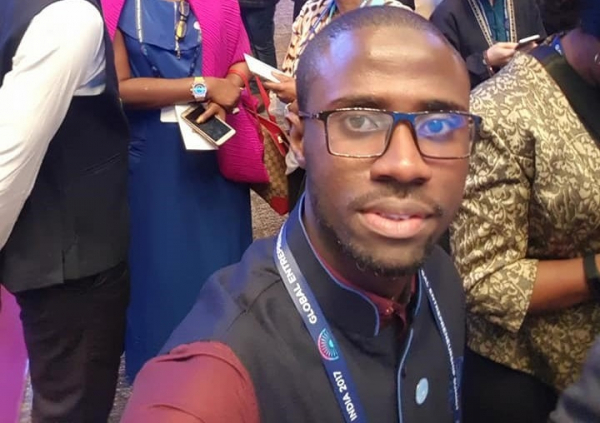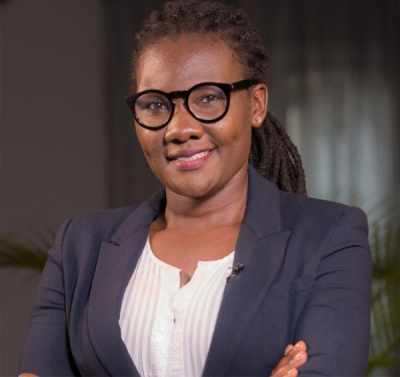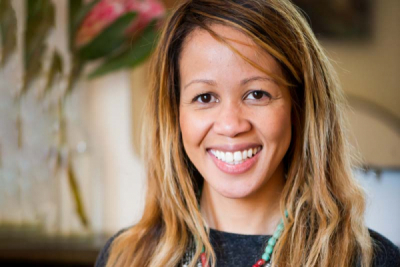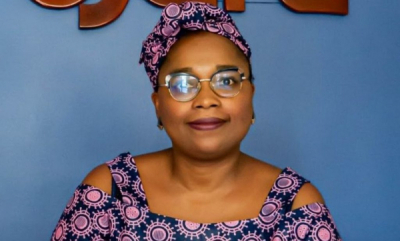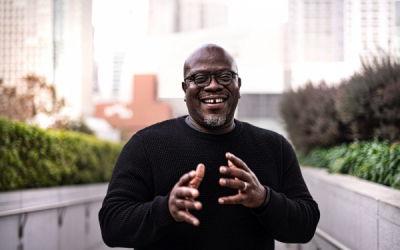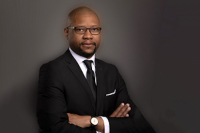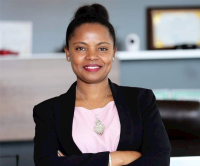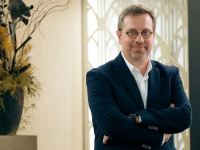
TECH STARS (1007)
After four years of witnessing the pains of women in a rural area where he was the head doctor, he created a healthtech to facilitate breast and cervical cancer screening.
Conrad Tankou (photo) is a Cameroonian entrepreneur and founder of heathtech startup Global Innovation and Creativity Space (GIC Space). Through GIC Space (founded in 2018), he developed GICMED, a project aimed at facilitating remote cervical and breast cancer screening.
“GICMED offers cutting edge and cost-effective MedTech and Telemedicine Innovations, enabling poor, remote, and rural communities with the greatest need to enjoy affordable and accessible healthcare,” the startup explains on its website. Indeed, with its services and products, notably breast and cervical cancer screening, smart speculum, fine needle biopsy syringe adapter, and digital pathology center, it allows patients to remotely and quickly get screened wherever they are. It also allows doctors to seek their colleagues’ contributions.
With GICMED, Conrad wants to help women living in remote areas quickly access cervical and breast cancer screening. His wish is to see the solution deployed in every village in Cameroon and Sub-Saharan Africa.
For his works, the P.h.D (in biomedical science in 2013) holder has earned several national and international awards and recognitions. For instance, through GICMED, he won Cameroon's 2019 Startup of the Year award. Then, a year later, he won the Next Einstein Forum Challenge in Kigali. In 2021, GICMED was the winner of the Africa Young Innovators for Health Award presented by the International Federation of Pharmaceutical Industries and Speak Up Africa.
Before GIC Space, Conrad Tankou had co-founded (with his compatriot Alain Nteff) GiftedMom, in 2013, to improve maternal and child health. From 2014 to 2018, he was the head doctor of Bambalang Medical center, in North-West Cameroon.
Melchior Koba
Barry heads two digital projects, providing solutions to both young tech entrepreneurs and the general public. He is always on the lookout for “the next thing to create.”
Adulaï Bary (photo) is a Bissau-Guinean serial entrepreneur and co-founder of incubator InnovaLab GW. Thanks to the Bissau-based incubator he co-founded in 2016 (with Claudinecia Cabral), he built an ecosystem that facilitates innovative entrepreneurship in the education, agriculture, health, and infrastructure sectors. He offers local innovators the opportunity to mature their project ideas and create successful startups.
He is also the founder of BIGTechnologies SARL (founded in 2014), which develops IT solutions for public and private institutions. Through BIGTechnologies SARL, he designed Ubuntu 2S, a smart solar home, and kiosk system, which helps provide clean energy in remote areas. With Ubuntu 2S, he wants to contribute to digital inclusion in rural areas by first solving their energy access problems. The project, which is operational since 2020, won the Live Innovation Impact Grant Program at the Dubai 2020 World Expo.
In conjunction with his entrepreneurship career, Bary also has prolific professional experience. With a BSc in Applied Computer Science (obtained in 2012), he started his professional career as a storage manager for MOGJ Commerce, a local commercial firm. The same year, he joined Orange Bissau as a support systems engineer before his promotion to the position of functional manager.
After leaving Orange Bissau, in 2018, he became a UNDP consultant for business incubator feasibility. From 2019 to 2020, he was also a youth employment specialist for the International Organization for Migration (IOM).
Apart from his BSc in applied computer science, Adulaï Bary also has an MBA in Business and entrepreneurship obtained, in 2016, from the University of Nevada, during his Mandela Washington Fellowship. In 2017, he took part in the Global Entrepreneurship Summit. Then, from 2017 to 2019, the serial entrepreneur was the Bissau Guinean ambassador to Next Einstein Forum, which highlights breakthrough discoveries and promotes scientific cooperation. In 2018, he was selected as one of the 100 most influential West African young leaders.
Melchior Koba
She federated law professionals to give African countries the required expertise for the development of adequate innovation frameworks. Her works earned her the recognition of several renowned institutions and agencies.
Linda Bonyo (photo) is a Kenyan lawyer specializing in digital law. Her works focus on data governance, digital identity, internet governance artificial intelligence, intellectual property, Etc…, help improve digital regulations and policies in Africa.
She is also an entrepreneur who founded Lawyers Hub, a legaltech company, in 2017. As a pan-African lawyers’ network, Lawyers Hub specializes in digital law training and consulting. Through her legaltech, Linda organized, in 2020, Africa’s first lawtech festival. Baptized Africa Law Tech Festival, it gathered more than 20 African countries and over 1,000 participants.
To support tech startups and promote collaboration between tech and law professionals, she created Lawyers Innovation Hub. All those achievements surely contributed to her selection to this year’s edition of the RoW100: Global Tech's Changemakers list that celebrates those who are “shaping national policies,” among others.
As an attorney at the Supreme court of Kenya and member of several legal organizations such as the Pan African Lawyers Union and the East Africa Law Society, she wants to get fellow lawyers more involved in innovation policies. “The place of policy in innovation I believe should be passionately pursued by lawyers, however, this is not the case presently. Many lawyers, regulators, and policymakers are caught in a maze on what exactly innovation and tech means for the future of regulation and entrepreneurship,” she believes.
Linda began her professional career in 2010 at CRADLE Child Rights Foundation. The same year, she joined the Jomo Kenyatta University of Agriculture and Technology Ombudsman's office as the Legal Director. From 2013 to 2014, she worked for Transparency International as a governance and policy lawyer. Then, from 2014 to 2017, she was an immigration lawyer at the law firm Bonyo & Co. She was also a member of the 2020-2021 cohort of the Tech Women Emerging Leaders Fellowship. Since 2021, she is a contractual Digital ID & Data Governance consultant for the United Nations Economic Commission for Africa. She is also a member of the Real Facebook Oversight Board, in charge of content moderation decisions.
Melchior Koba
Instead of pursuing a conventional career after her Ph.D. in Human genetics, she chose the entrepreneurship world. Nowadays the startup she co-founded helps millions of domestic workers earn better income.
Aisha Pandor (photo) is a South African scientist and entrepreneur. In 2014, she co-founded (with her husband Alen Ribic) Sweepsouth, a startup connecting domestic workers with potential employers.
Currently, the startup is available through a web and mobile app. It claims about 1.2 million domestic workers and some 10,000 monthly users (employers) in Cape Town, Durban, and Johannesburg. Sweepsouth was created to help busy people find quick and trustworthy domestic workers.
“Our nanny was going to be going away on holiday [...] at a very inconvenient time. While trying to replace her, we [Ed.note: Sweepsouth founders] realized that there was a business opportunity here, that actually we could build something that helped busy people like ourselves get a quick replacement for a nanny or domestic worker, but in doing that would also be helping people who work in this industry who are unemployed or underemployed to find work opportunities,” Aisha explained in a videocast.
The co-founder holds a Ph.D. in Human Genetics from the University of Cape Town (in 2011). However, instead of following a normal career path, she preferred the entrepreneurship world. I “figured out that I just was not cut out to be employed…,” she explains. Before her dip into the entrepreneurship world, she spent months as an associate manager at the University of Cape Town and a business analyst for consulting firm Accenture.
The scientist turned entrepreneur has received numerous awards and recognitions for her contribution to the improvement of domestic workers’ revenue. In 2014, she won the SiMODiSA Start-up SA Pitching Competition award. Months later, in 2015, she was selected for the 500 Global accelerator program in Silicon Valley. She also received the Best Female Tech/E-Commerce Entrepreneur and Best Black Tech/E-Commerce Entrepreneur at the 2016 PriceCheck Tech & E-Commerce Awards. The following year, she received the World Economic Forum's Africa’s breakthrough female innovators' award. In 2018, her startup also won the best small business category at Savca Industry Awards.
After some eight years in the South African market, Aisha Pandor wants to expand in international markets, Kenya notably. “We are looking at other countries on the continent where people experience the same sort of issues we did when we first came up with the idea for SweepSouth. The sky’s the limit,” she indicates.
Melchior Koba
Leveraging her professional experience, she created a secured and efficient platform that offers millions of Africans the possibility to invest in fractional shares and slivers of cryptocurrencies as well as get sound financial education.
Nelly Chatue-Diop (photo) is a Cameroonian tech entrepreneur specializing in the fintech sector. In 2020, she co-founded Ejara, a blockchain-powered mobile investment platform allowing users to buy slivers of high-priced cryptocurrencies and fractional shares. Thanks to the platform, users have access to financial education and can also save (starting from US$0.16 per deposit) through mobile money.
I created Ejara “to allow everyone to create, protect and increase their wealth and savings wherever they are in Africa,” Chatue-Diop explains. As a seasoned entrepreneur, she has much professional and entrepreneurship experience in the tech world. With an MSc in electronics, computer science, and telecommunications, she started her professional career, in 2004, as a software engineer for Accenture. In 2007 and 2008, she got an MBA in Corporate Finance from HEC Paris and an MBA in Finance from the London Business School. Concurrently, she made a brief stint as a summer associate at Credit Suisse before joining Revenue Management Solutions (RMS), a multinational offering data-driven solutions to help restaurants improve decision-making.
From 2011 to 2015, she climbed up the corporate ladder of grocery store chain Franprix before joining Darty as a pricing director. While still with Franprix, she co-founded Booper, a company offering price optimization solutions. In 2018, months after leaving Darty, she also co-founded Nzinghaa Lab, specializing in Artificial intelligence and blockchain. At the same time, she was still the chief data officer of Betclic Group, which she left in 2020. The same year when she left Betclic Group, she was appointed chairperson of the board of Giotto.ai, a “one-stop AI Cloud platform encompassing cutting-edge integrative tools and powerful libraries.” In 2021, she co-founded Sewelo Africa Digital Training, an online learning platform.
Nelly’s professional career earned her several awards. In 2013, she won the award of the most-committed woman in the French retail industry. She was named one of the Top 10 Chief Data Professionals in Europe and in 2020, she made it to CDO Magazine's Global Data Power Women list and the Global Top 100 Data Visionaries.
Melchior Koba
With years of combined professional and entrepreneurship experience in Africa’s fintech sector, Dare is committed to facilitating cross-border transactions.
Beninese fintech entrepreneur Dare Okoudjou (photo) is the founder and CEO of MFS Africa, Africa’s largest digital payment gateway. Through his startup, he interconnects close to 320 million mobile money wallets offering service providers the opportunity to reach more people with their products targeting unbanked and underbanked populations.
Dare founded MFS Africa in 2009 to help Africans make payments worldwide. The startup’s main goal is to make transactions as easy as ABC. Its mission is to develop solutions so that the only thing needed for payment anywhere in the world will be a mobile money wallet.
With an MSc in Telecom Engineering from Telecom Paris (in 1999), MFS Africa’s founder started his professional career as a telecom consultant for PricewaterhouseCoopers (PwC) in 1999. Some years later, he joined MTN Group first as a Senior Manager before his promotion to the position of Head of Mobile Money international development. In 2017, his startup was recognized by the U.S business magazine as one of the ten most innovative companies in the world. In 2020, the global community of impact entrepreneurs Endeavour selected him as one of the most impactful entrepreneurs in the world. The following year, he took part in MIT’s Foundry Fellowship along with 12 African innovators.
A few days ago, Dare Okoudjou made it to the list of Rof World’s 100 global tech changemakers. His ambition is to make borders meaningless in payment transactions. For that purpose, last year, he secured US$100 million during a Series C debt and equity financing round co-led by AfricInvest FIVE and several investors.
Melchior Koba
The serial entrepreneur has over ten years of professional experience in IT consulting and business development. Thanks to Dreamcash, he will be among the founders to be celebrated during the first edition of the AfricaTech Awards
Cyril Owona (photo) is a Cameroonian entrepreneur, co-founder, and CEO of Dreamcash, a fintech startup developing innovative and mobile solutions to help users manage their finances.
Based in Yaoundé, Cameroon, the fintech startup was founded in 2020, with Fabrice Atangana as its co-founder. It created MiQo, a neobank allowing unbanked individuals access to all the conventional banking services, including microloans. The startup is among the 45 finalists to be celebrated at the AfricaTech Awards, which will be held on the sidelines of the VivaTech summit (June 15-18, 2022) in Paris, France.
The selection “greatly motivates a young team that has, for years now, dedicated itself to developing tech solutions to effectively boost financial inclusion in emerging markets despite the hard work and sacrifice endured,” Cyril Owona wrote on his Linkedin page.
The latter’s entrepreneurship career began in 2016, in Canada, when he created Innova Services-Conseil International Inc (ISCI), a consulting firm specializing in IT business development and marketing consulting. The following year, he founded CPAI Inc to boost digital transformation in Africa. He is, since February 2021, the CEO of Sewelo Africa Digital Training, an online learning platform.
Before going into the entrepreneurial world, Cyril acquired extensive professional experience. He started in 2006, as a project manager for Alpha Fund before his promotion to an Alpha Fund branch Manager. In 2009, he joined consulting firm ANEO as an IT recruiter. After brief stints in Logica and Umanis, he became the director of IT consultant Odesia.
Melchior Koba
The digital solution is the result of one of Hybrid Designs' co-founders’ personal experience. Created to address security and affordability problems, it already claims over 100,000 users.
Samrawit Fikru (photo) is an Ethiopian software developer, co-founder, and CEO of Hybrid Designs, a software development firm. In December 2014, her startup (founded in 2011) launched Ride, a ride-hailing solution.
RIDE was created to address several problems including security and affordability. “I used to constantly find myself at the office late at night and challenged by transport hurdles while heading to my home. [...] I used to feel unsafe while taking a taxi…the driver also asks you to pay more than two times the price they charge in a day,” Samrawit recounted in 2019.
The co-founder graduated from MicroLink Information Technology College in 2004 with a diploma in software engineering and started her professional career in 2005 as a software engineer at Revots PLC. In 2006, while working at Revots, she graduated with a BSc in Computer Science from the HiLCoE School of Computer Science and Technology.
In 2007, she joined CNET Software Technology PLC as a programmer, and, the following year, she was recruited as a software developer by Cybersoft software Company. Two years later, she flew to Cameroon where she worked at 4Afri Mobile Technology Company as a senior application engineer. In 2011, she returned to Ethiopia and joined DH MicroHard Solutions as a product line manager.
Since 2013, Samrawit Fikru is a member of the African Women’s Entrepreneurship Program (AWEP), a program providing technical support to its members. Last week, the Ethiopian entrepreneur earned international recognition as one of the Rest of World (RoW)'s 100 Global Tech Changemakers. The recognition celebrates her journey and achievement in the tech world.
Melchior Koba
He is appointed just one year after assuming the position of general secretary of the same agency he will oversee. In his new position, he will have to address several challenges to make the domestic ICT market more attractive to investors and boost digital adoption.
Inoussa Traore (photo) is, since May 18, the new executive director of Burkina Faso’s Agency for the Promotion of Information and Communication Technologies (ANPTIC). A research professor in economics, innovation, and ICT, he is the fifth executive director to preside over ANPTIC's destinies since its creation in 2014.
In May 2021, when he was appointed ANPTIC executive secretary, Inoussa Traore commented that there were significant challenges facing Burkina Faso’s digital transformation plans. He also hoped the ICT promotion agency would be up to par with expectations. Now that he is at the helm, he will have the chance to make his wish come true.
The new executive director has a doctorate in economic science obtained from Thomas Sankara University (formerly Ouaga II University), in 2019. He began his professional career in 2008 with Yam Pukri Association, an association specialized in training and consulting in the ICT sector. In 2012, he was appointed the head of the International Institute for Water and Environmental Engineering (2iE) program aimed at building the capacities of rural electrification actors and operators in West Africa. Five years later, he joined the Moving Energy Initiative (MEI 2), as a project coordinator, to improve access to electricity services and products in Burkina Faso’s Sahel region and refugee camps.
Since 2014, he is a professor and researcher at Joseph Ki-Zerbo University. He is also a member of the coordination team of the university’s incubator (Incubuo). He is notably in charge of entrepreneurship and management support issues.
In 2020, Mr. Inoussa initiated the FabLab university project selected among the 92 projects that were to benefit from the €1 million Fund set up by the Francophone University Agency to support member universities amid the coronavirus pandemic.
Melchior Koba
With 27 years of professional experience in Orange S.A., Jérôme Hénique will replace the current CEO appointed in 2018. As the new CEO, he will carry out strategic projects in the markets he oversees.
Jérôme Hénique (photo) will officially become the new CEO of Orange Middle East and Africa (OMEA) next July 1. His appointment was announced Tuesday (May 24) in a release published on Orange S.A.’s website. The incoming CEO will replace Alioune Ndiaye who will remain OMEA’s non-executive chairman.
Currently, the incoming CEO is OMEA’s chief operating officer and deputy CEO. As the CEO, he will carry on with actions aimed at developing the group’s subsidiaries in OMEA (one in Jordan and seventeen in Africa) that grew by 9% and generated a €6,381 million turnover in 2021.
Jérôme Hénique joined Orange S.A. (then known as France Telecom) as a consultant in 1994. Up to early 2009, he was consecutively senior consultant for Expertel Consulting, chief Marketing Officer for Wanadoo Europe, Strategic Marketing Director, and Vice President of Consumer Marketing for France Telecom. In 2009, he was promoted to the position of France Telecom’s Senior Vice President of Marketing.
From 2010 to 2015, the senior executive was Deputy CEO of Orange subsidiary in Senegal (SONATEL). Then, from 2015 to 2018, he was CEO of Jordan Telecom Group (Orange subsidiary in Jordan) before his promotion to COO and deputy CEO for Orange MEA.
His appointment is in line with Orange Group CEO Christel Heydemann’s ambition to accelerate digital transformation and growth in some key markets and become a multiservice operator. The group has lofty ambitions for most of its markets. It notably wants to boost broadband internet offers and develop the mobile money market. In the Middle East and Africa region, it is active in segments like health, education, banking, and cybersecurity.
Muriel Edjo
More...
The serial entrepreneur launched several successful projects focused on the African market. Throughout his entrepreneurial career, he has garnered several awards.
In 2018, Senegalese-born entrepreneur Oumar Basse (photo) co-founded Yobante Express with Badra Badji. A computer scientist by trade, Basse wants to optimize last-mile delivery in emerging markets.
Yobante Express “democratizes last-mile delivery,” and is more affordable, co-founder Basse says. According to the latter, the startup can deliver products from Dakar to other Senegalese regions for as low as XOF1,200.
From its base in Delaware, USA, his startup operates in Senegal, Ghana, South Africa, and Nigeria. Through its web and mobile platforms, it networks freelance transporters with traders and individuals, creating a trusting environment beneficial to every party. In 2021, it raised US$1.2 million from Grenfell Holdings, Launch Africa Ventures, R-Ventures, Libertad, and a pool of local and international angel investors.
Oumar Basse holds a master's in distributed information systems (DIS) from Cheikh Anta Diop University (2016), Dakar. He started his professional career one year earlier as a sales agent for PCCI Group, a business process outsourcing multinational. In 2017, he co-founded Nano Air, which developed a remote irrigation system (WIDIM POMPE) allowing farmers to manage their crop watering tasks remotely using their cellphones. In 2018, thanks to Nano Air, Oumar Basse won the second special award at the Agri Startup Summit held in France.
Melchior Koba
In the past eleven years or so, the Minister of the Digital Economy has demonstrated her commitment to digital inclusion in Togo. She piloted several public projects that positioned her country on the list of global digital nations.
Cina Lawson (photo) is a Togolese politician and currently the Minister of Postal Affairs and Digital Economy. She is one of the three Francophone Sub-Saharan tech actors to be on Rest of World’s 2022 list of the 100 Global tech Changemakers. The recognition celebrates her numerous contributions to the development of the digital sector in her country, Togo.
Indeed, she joined the Togolese government in 2010 as the Minister of Posts and Telecommunications. On September 7, 2013, she was appointed Minister of the Digital Economy. Since then, she has been piloting the country’s e-government project. She also oversaw the introduction of information technology in the education sector, carried out digital inclusion projects profiting the most vulnerable, and enhanced competition in the telecom market by awarding licenses to two new internet service providers (Teolis SA and Vivendi Africa) in June 2017. In June 2018, Miss Lawson also extended the licenses of telecom operators Moov Togo and Togo Cellulaire, adding 4G to their service spectrum. Months later, she oversaw the privatization of incumbent operator Togocom and updated Togo’s ICT regulatory framework.
The Digital Minister holds a Diploma of Advanced Studies (DEA) from the Paris Institute of Political Studies (1997). She also holds a Master's in History from Paris-Nanterre University (1998), and a Master's in Public Policy from the Harvard Kennedy School (2001). She began her professional career at the World Bank in 1998. In the Information and Communication Technology Department in Washington DC, she advised governments on telecom policies, regulatory reforms, and privatizations. She also worked as a consultant for Alcatel-Lucent in Paris and, from 2005 to 2010, she was working for France Telecom SA.
She has received several recognitions for her impact on her country’s ICT sector. In 2016, she was named by Tropics Magazine as one of the 55 actors moving Africa forward. In January 2019, Cina Lawson won the Napoleon Innovation Award, awarded by a professional network dedicated to the promotion of “virtuous, ethical innovation that benefits the many.” The following month, she won the Harvard Kennedy School’s Alumni Public Service Award for her commitment and contribution to the development of the ICT sector. She was thus the first African female politician to win the award since its creation in 1997.
In October 2021, Cina Lawson received the "Woman of the Year Award" from UC Berkeley’s Fisher Center for Business Analytics for Novissi, the social assistance project implemented through a digital platform to support low-income populations during the Covid-19 crisis. She was praised for her innovative work in leveraging non-traditional data and analytics to target and distribute emergency financial assistance to the most vulnerable.
Melchior Koba
With some 15 years of professional experience in the marketing and finance sector, she wants to address the financing problems faced by innovative entrepreneurs in Africa.
Fatoumata Bâ is a Senegalese tech entrepreneur and venture capital investor. In 2018, she founded Janngo, an investment firm based in Abidjan, Côte d’Ivoire. Her firm supports and invests in pan-African startups that use technology to boost access to crucial services, products, content, markets, finance, jobs, and talents in Africa.
Speaking on the reasons that prompted her to create Janngo, Fatoumata Bâ explained that she aimed to create Pan-African digital champions with sustainable and economically viable business models and help address important social problems.
Shortly after its creation, in 2018, Janngo unveiled a digital platform (Jexport) that allows local farmers to sell their products to foreign buyers at affordable prices. In December 2021, the investment firm raised XOF7 billion (US$11.4 million) to fund the African private sector. The funds were raised from the African Development Bank (AfDB), the European Union, and the Organisation of African, Caribbean, and Pacific States.
Janngo’s founder and executive chair holds a Master’s in Management, Strategy, Marketing, and Finance from Toulouse Business School (2009). Her professional career started in 2007 with Index Multimedia where she was an account manager and business developer. Less than twelve months later, she joined France Telecom as a sales advisor and, in September 2008, she obtained a promotion to a business analyst.
In March 2010, she was recruited as a senior consultant for the information technology company Atos Consulting. Three years later, she launched the Ivorian subsidiary of Jumia. Fatoumata Bâ became the Managing director of Jumia Nigeria in 2015 before her appointment as the marketing manager of Jumia group in 2016. She is now a board member for SouthBridge Investment Bank and an investment committee member for evergreen investment firm Creadev.
In 2016, she was on Forbes’ 30 Under 30 list, which lists the 30 most promising under-30 African entrepreneurs. She is also the winner of the 2019 Aenne Burda Award for Creative Leadership and one of the leaders on Choiseul's 2020 list of the 100 African Economic Leaders for Tomorrow. She is also one of the 20 Africans to be on the Rest of World’s 2022 Top 100 Global Tech Changemakers. This recognition celebrates her extensive professional background and contributions.
Melchior Koba
According to the World Bank, up to 65% of the adult population is unbanked in sub-Saharan Africa. In Nigeria alone, some reports estimate the number of unbanked adults to be 59 million. For those reports, the situation is due to several challenges namely the conservative policies and distance to access points. Babs Ogundeyi wants to address some of the problems with Kuda Bank, a digital-only bank.
Babs Ogundeyi (photo) is a young Nigerian entrepreneur and co-founder of Kuda Bank, a digital-only bank. Founded in 2017, the fintech startup was initially named Kudimoney with Musty Mustafa as its co-founder. It became Kuda Bank in 2019, following the obtention of a central bank license, in line with its ambition to make banking services more accessible to a larger number of the population in Africa.
Nowadays, via its mobile app, Kuda Bank allows Nigerians to manage their expenses and make savings online without paying maintenance or hidden fees. For its CEO, Babs Ogundeyi, the startup can even offer instant loans to its users provided their salaries are domiciled with Kuda.
Its co-founder Ogundeyi graduated from Brunel University London with a BA in Business Studies and Accounting. Right after his graduation, he went into the entrepreneurship world (in 2002) by co-founding MotorTrader Nigeria, a classified car ad magazine. One year later, he sold the magazine to a major Nigerian media. Around the same period, he joined PwC Nigeria as an Engagement Manager. In 2010, he left PwC Nigeria to become a partner at investment company Redbrick Ltd.
Some months later, he became the Oyo State government’s special advisor on finance. In the five years he spent in that position, he piloted the state’s largest-ever bond issue (NGN55 billion), advised on several fiscal policies, and set public and private partnerships.
Two years later, he resumed his entrepreneurship career with Kudimoney, which later became Kuda Bank. In 2021, the tech entrepreneur secured US$55 million series B financing to boost his startup’s presence in Nigeria. The Series B round raised the volume of investments attracted by Kuda Bank since 2019 to US$91.6 million and its value to US$500 million. At the time, Babs Ogundeyi said that Nigeria was an important market to be conquered before thinking about any international expansion.
Melchior Koba



